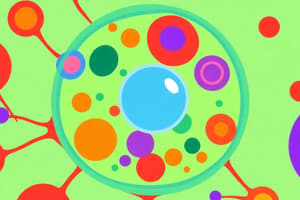Podcast
Questions and Answers
What are the two stages of the mitotic phase?
What are the two stages of the mitotic phase?
- cytokinesis and interphase
- mitosis and interphase
- mitosis and cytokinesis (correct)
- interphase and metaphase
Which type of cell divides by the cell membrane pinching together until the two cells split apart?
Which type of cell divides by the cell membrane pinching together until the two cells split apart?
- plant
- animal (correct)
- mineral
- chromosomal
If a cell has 18 chromatids, how many duplicated chromosomes does it have?
If a cell has 18 chromatids, how many duplicated chromosomes does it have?
- 6
- 18
- 9 (correct)
- 36
Which best describes how a plant cell divides?
Which best describes how a plant cell divides?
If a cell has 22 duplicated chromosomes, how many chromatids does it have?
If a cell has 22 duplicated chromosomes, how many chromatids does it have?
Which statement is NOT part of the cell theory?
Which statement is NOT part of the cell theory?
Which molecule is used to make proteins in the cell?
Which molecule is used to make proteins in the cell?
What is the main difference between prokaryotic and eukaryotic cells?
What is the main difference between prokaryotic and eukaryotic cells?
Which structure is NOT found in animal cells?
Which structure is NOT found in animal cells?
Which tool first allowed scientists to study cells?
Which tool first allowed scientists to study cells?
Which macromolecule contains genetic information?
Which macromolecule contains genetic information?
Active transport is characterized by the use of what to move substances through a membrane?
Active transport is characterized by the use of what to move substances through a membrane?
The diffusion of water molecules through a cell membrane is known as what?
The diffusion of water molecules through a cell membrane is known as what?
Which of the following is a rule that describes a pattern in nature?
Which of the following is a rule that describes a pattern in nature?
A prediction or statement that can be tested is __________.
A prediction or statement that can be tested is __________.
An explanation of observations of events based on knowledge gained from many observations and investigations is which of the following?
An explanation of observations of events based on knowledge gained from many observations and investigations is which of the following?
What should a scientist do first if a hypothesis is NOT supported?
What should a scientist do first if a hypothesis is NOT supported?
Which group is the part of a controlled experiment where the independent variable does not change?
Which group is the part of a controlled experiment where the independent variable does not change?
How many times does a compound light microscope with an ocular lens of 10x and an objective lens of 25x magnify an object?
How many times does a compound light microscope with an ocular lens of 10x and an objective lens of 25x magnify an object?
Who was the first person credited with discovering cells?
Who was the first person credited with discovering cells?
Which type of microscope produces a 3-dimensional image of an object?
Which type of microscope produces a 3-dimensional image of an object?
Flashcards
Scientific Law
Scientific Law
A rule that describes a pattern in nature, often based on repeated observations and experiments.
Hypothesis
Hypothesis
A testable prediction or statement that proposes an explanation for an observation or phenomenon.
Scientific Theory
Scientific Theory
An explanation supported by a large body of evidence, based on numerous observations and experiments. It may be modified or refined as new information is discovered.
Control Group
Control Group
Signup and view all the flashcards
Microscope Magnification
Microscope Magnification
Signup and view all the flashcards
Robert Hooke
Robert Hooke
Signup and view all the flashcards
Scanning Electron Microscope (SEM)
Scanning Electron Microscope (SEM)
Signup and view all the flashcards
Transmission Electron Microscope (TEM)
Transmission Electron Microscope (TEM)
Signup and view all the flashcards
Cytokinesis
Cytokinesis
Signup and view all the flashcards
Mitosis
Mitosis
Signup and view all the flashcards
Animal Cell Division
Animal Cell Division
Signup and view all the flashcards
Plant Cell Division
Plant Cell Division
Signup and view all the flashcards
Chromatids
Chromatids
Signup and view all the flashcards
Cell Theory
Cell Theory
Signup and view all the flashcards
Prokaryotic Cells
Prokaryotic Cells
Signup and view all the flashcards
Eukaryotic Cells
Eukaryotic Cells
Signup and view all the flashcards
Glycolysis
Glycolysis
Signup and view all the flashcards
Passive Transport
Passive Transport
Signup and view all the flashcards
Active Transport
Active Transport
Signup and view all the flashcards
Osmosis
Osmosis
Signup and view all the flashcards
Cell Division
Cell Division
Signup and view all the flashcards
Study Notes
Life Science Midterm Study Guide - Unit 1
- Scientific Rules: Scientific laws describe patterns in nature
- Scientific Theories: Scientific theories explain observations of events based on knowledge from observations and investigations
- Hypothesis: A testable prediction or statement
- Control Group: Used in controlled experiments to observe the independent variable, where the independent variable does not change
- Experimental Group: This is the part of a controlled experiment that is measured and changed to observe results
Life Science Midterm Study Guide - Unit 2
- Compound Light Microscope Magnification: To find the total magnification of a compound light microscope, multiply the ocular lens magnification by the objective lens magnification
- Cell Discovery: Robert Hooke was the first person credited with discovering cells
- Cell Theory: All living things are made up of one or more cells
- Prokaryotic vs. Eukaryotic Cells: Eukaryotic cells have their genetic material surrounded by a membrane, while prokaryotic cells do not
- Animal Cells: Animal cells do not have cell walls
Studying That Suits You
Use AI to generate personalized quizzes and flashcards to suit your learning preferences.




